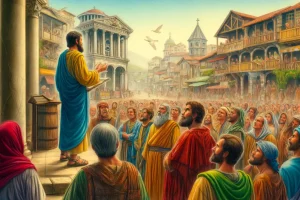
The Book of 2 Samuel
The Book of 2 Samuel is a vital historical and theological text within the Hebrew Bible and Christian Old Testament, chronicling the reign of King David after he becomes the ruler of all Israel. Here are some concise key facts about 2 Samuel:
- Title and Position: Named after Samuel, the prophet, despite his death being recorded in 1 Samuel. 2 Samuel is the tenth book in the Christian Old Testament and continues the narrative set forth in 1 Samuel.
- Authorship and Date: Like 1 Samuel, the exact authorship of 2 Samuel is not specified in the text, but it is traditionally attributed to the prophets Nathan and Gad. Scholars suggest it was compiled in the 10th to 7th centuries BC.
- Structure and Content: The book details the consolidation of David’s kingship, his military conquests, administrative arrangements, moral failures, family problems, and the consequences of his actions. It can be divided into:
- David’s Triumphs (Chapters 1-10): David unites Judah and Israel, establishes Jerusalem as the capital, and expands the kingdom through military campaigns.
- David’s Transgressions and Troubles (Chapters 11-20): Covers David’s adultery with Bathsheba, the murder of Uriah, the revolt of Absalom, and other familial and political crises.
- Appendices (Chapters 21-24): Various accounts of David’s reign, including his psalms of deliverance, a famine, further battles, and a census that brings divine wrath upon Israel.
- Main Themes:
- Leadership and Kingship: Explores the complexities and responsibilities of kingship, emphasizing both the divine blessing on David and the moral standards expected of a king.
- Sin and Repentance: Highlights the severe consequences of David’s sins for himself and for Israel, as well as his repentance and the restoration that follows.
- Divine Justice and Mercy: Illustrates how divine justice operates alongside mercy, with God punishing wrongdoing while also preserving the Davidic line.
- Theological Significance:
- The narrative contributes significantly to the development of the Davidic covenant, which promises that David’s lineage will endure forever, a theme that is pivotal in both Jewish messianic expectations and Christian Christology.
- 2 Samuel also deals with the Ark of the Covenant, emphasizing the centrality of worship and the presence of God in the life of Israel.
- Modern Relevance: 2 Samuel offers deep insights into human nature, leadership, the consequences of personal failings, and the hope of redemption, making it a profound text for both personal reflection and communal instruction.
The Book of 2 Samuel is a pivotal text in the Hebrew Bible, providing a detailed account of King David’s reign over Israel. It serves as a continuation of the narrative begun in 1 Samuel, focusing on David’s consolidation of power, his successes, and his profound moral failures, all of which had lasting implications for his kingdom and the future Messianic hope of Israel. Here is a detailed analysis of 2 Samuel, examining its structure, content, major themes, and theological significance.
Structure and Content
1. David’s Consolidation of Power (Chapters 1-10):
- David’s Mourning and Rise to Kingship: Begins with David lamenting Saul and Jonathan’s deaths, and his gradual rise to power, first in Judah and then over all Israel.
- Establishment of Jerusalem: David captures Jerusalem, making it his capital and the religious center by bringing the Ark of the Covenant there, symbolizing God’s presence and blessing.
- Military Campaigns: David expands Israel’s territory through various military campaigns, securing the kingdom’s borders and establishing dominance in the region.
2. David’s Personal Failures and Family Turmoil (Chapters 11-20):
- Sin with Bathsheba: David’s adultery with Bathsheba and the subsequent murder of her husband, Uriah, mark a turning point in David’s life and reign, initiating a series of personal and familial crises.
- Nathan’s Prophecy: The prophet Nathan confronts David, leading to his repentance, but the prophecy foretells trouble within his own house.
- Absalom’s Rebellion: Details the tragic story of Absalom, who rebels against David, leading to civil war and immense personal grief for David. Absalom’s death underscores the devastating consequences of familial betrayal and political ambition.
3. Final Reflections and David’s Legacy (Chapters 21-24):
- Various Appendices: Includes narratives about a famine, more military exploits, David’s psalms of deliverance, and a problematic census that leads to a plague as punishment for David’s pride.
- David’s Last Words: Offers reflections on his reign, emphasizing the justice of God and the ideal of righteous rule.
Major Themes
1. Kingship and Covenant:
- 2 Samuel explores the nature of biblical kingship, particularly through David, who is both flawed and faithful. His reign is seen as the fulfillment of divine promises yet is marred by personal sin, illustrating the tension between divine providence and human free will.
2. Sin, Repentance, and Consequences:
- David’s life exemplifies the serious consequences of sin—not only personal guilt and divine judgment but also the impact on one’s family and nation. His repentance, while sincere, does not shield him from the repercussions of his actions, illustrating the complexity of forgiveness and justice.
3. God’s Justice and Mercy:
- Throughout the narrative, themes of justice and mercy intertwine. God’s covenant with David includes both blessings for obedience and curses for disobedience, reflecting a balanced portrayal of God’s character as just but merciful.
4. Theological Significance of Jerusalem and the Ark:
- The establishment of Jerusalem as the political and spiritual center and the emphasis on the Ark of the Covenant highlight the central role of worship and God’s presence in the life of Israel.
Theological Significance
The narrative of 2 Samuel is foundational for understanding the Davidic Covenant, which becomes a central theme in Jewish Messianic expectations and Christian Christology. This covenant promises an eternal dynasty to David, a promise viewed as ultimately fulfilled in Jesus Christ according to Christian theology.
Conclusion
2 Samuel provides a rich narrative full of intrigue, drama, and profound lessons about power, responsibility, and divine oversight. It portrays King David in a balanced light, highlighting his significant achievements and grave failures, making it a text of enduring relevance and deep human insight.
Tag:Absalom's rebellion, Amnon, Ark of the Covenant, Bathsheba, biblical history, Book of 2 Samuel, civil war, David's reign, Davidic covenant, divine judgment, divine justice, Gibeonites, Jerusalem, Joab, King David, King Saul, kingdom of Israel, mercy, messianic promise, military campaigns, Nathan the prophet, Old Testament, political intrigue, repentance, royal succession, Sheba's revolt, Tamar, Uriah



